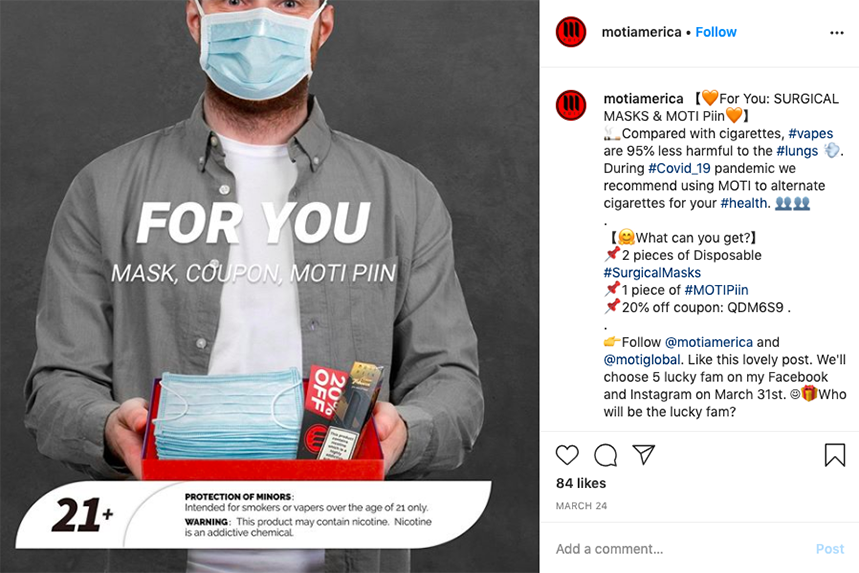

Tobacco and e-cigarette companies have been accused of using the COVID-19 crisis to advertise e-cigarettes on social media and “undermine minimum age purchase restrictions” that protect minors.
The not-for-profit activist group Campaign for Tobacco-Free Kids analysed the marketing tactics of big tobacco, e-cigarette and vaping companies in 28 countries, including the UK.
It found that on social media, the two largest tobacco companies – Philip Morris International and British American Tobacco – had appropriated ‘Stay at home’ hashtags used by governments and health authorities to market heated cigarette products, such as Glo and iQOS, and e-cigarettes, including Vype.
During the coronavirus pandemic, public health experts have warned that smokers and e-cigarette users are more likely to be vulnerable to COVID-19, and that smoking increases the risk for respiratory infections, weakens the immune system and can cause health conditions that increase risk of serious illness.
The social media and influencer activity ranges from incorporating ‘Stay at home’ messaging and imagery to special offers and discounts for purchases made during lockdown.
Some brands have used influencers to promote branded masks, and another has even posted a note thanking nurses on International Nurses Day. The not-for-profit also claimed that Philip Morris has waived ID validation checks in countries including the UK, a claim the tobacco giant has vehmently denied.
Posts advertising tobacco products were published after Facebook’s December 2019 announcement that its platforms would no longer allow influencers to promote tobacco products online.
In the UK, which has seen less aggressive tactics, BAT’s Glo Worldwide account posted about “partying at home” using the hashtag #netflixparty (see below). It also posted about #workingfromhome (with #discoverglo and #myglo).

The Campaign for Tobacco-Free Kids told PRWeek that Vype UK social-media accounts are one of the only BAT accounts that did not explicitly use COVID-19 references, but had promoted free delivery and “ordering in” during lockdown.
In other countries the marketing of e-cigarettes, vapes and heated tobacco products had a much clearer coronavirus theme.
In the US, e-cigarette makers and vape shops have engaged in pandemic-themed promotions such as free giveaways of protective masks with purchases and offering COVID-19 themed discounts (such as ‘get 19 per cent off nicotine e-liquids by entering the code COVID-19’).
In one promotion, vaping brand Moti America thanked nurses on International Nurses Day.

The study also found that British American Tobacco is promoting its heated cigarette Glo in several countries in special deals with discounts, contest prizes, branded face masks and hand sanitiser.
In Kazakhstan, BAT has provided Glo-branded masks to more than a dozen Instagram influencers who posted photos wearing the masks, with captions advertising free Glo masks with the purchase of a Glo device.

In Greece, Glo has run a ‘Stay home’ campaign on Instagram (below).

Bidi Vapor claimed on Instagram that “A Bidi Stick a day keeps the pulmonologist away.”

In addition to social-media promotions, the report claimed Philip Morris has waived ID validation on delivery of IQOS in at least one country and referred to the COVID-19 crisis in at least 18 countries, including the UK, to promote special offers and home delivery of the product.
Philip Morris International told PRWeek claims it has waived ID validation were “deliberately misleading” and it had only encountered one case where a delivery service did not meet its obligations to check ID.
“We have not waived age verification on delivery anywhere,” a spokesperson said. “We have instructed our markets to verify the age and identity of legal age users upon delivery, while complying with all government recommended COVID-19 safety measures.
“We are aware of a single case where these practices were not followed. We have carefully studied the facts and discovered a clear violation of our standards by the delivery service. We have already reiterated to the delivery service our age-verification requirements to avoid the possibility of Heatsticks being delivered to underage people.
In response to claims companies are exploiting ‘Stay at Home’ messaging, PMI added: “To ensure customers continue to observe government ‘stay at home’ guidance, we have informed adult users how they can purchase smoke-free products online, like many other retailers. This is particularly important to ensure that IQOS users do not go back to cigarettes.”
Campaign for Tobacco-Free Kids president Matthew L Myers said tobacco and vaping companies will “stop at nothing” to sell more products, even if it means “shamelessly capitalising on a pandemic”.
He added: “It’s not just Big Tobacco – vape shops and e-cigarette-makers have stooped to new lows to target young people, mislead consumers and sell more e-cigarettes. As we continue to learn more about the harmful links between COVID-19 and tobacco use, these tactics should raise the alarm in every country around the world.”
British American Tobacco has also been approached for comment.
more recommended stories
 Anxiety Reduction and Emotional Support on Social Media
Anxiety Reduction and Emotional Support on Social MediaKey Summary Anxiety commonly begins in.
 Liquid Biopsy Measures Epigenetic Instability in Cancer
Liquid Biopsy Measures Epigenetic Instability in CancerKey Takeaways Johns Hopkins researchers developed.
 Human Antibody Drug Response Prediction Gets an Upgrade
Human Antibody Drug Response Prediction Gets an UpgradeKey Takeaways A new humanized antibody.
 Pancreatic Cancer Research: Triple-Drug Therapy Success
Pancreatic Cancer Research: Triple-Drug Therapy SuccessKey Summary Spanish researchers report complete.
 Immune Cell Epigenome Links Genetics and Life Experience
Immune Cell Epigenome Links Genetics and Life ExperienceKey Takeaway Summary Immune cell responses.
 Dietary Melatonin Linked to Depression Risk: New Study
Dietary Melatonin Linked to Depression Risk: New StudyKey Summary Cross-sectional analysis of 8,320.
 Chronic Pain Linked to CGIC Brain Circuit, Study Finds
Chronic Pain Linked to CGIC Brain Circuit, Study FindsKey Takeaways University of Colorado Boulder.
 New Insights Into Immune-Driven Heart Failure Progression
New Insights Into Immune-Driven Heart Failure ProgressionKey Highlights (Quick Summary) Progressive Heart.
 Microplastic Exposure and Parkinson’s Disease Risk
Microplastic Exposure and Parkinson’s Disease RiskKey Takeaways Microplastics and nanoplastics (MPs/NPs).
 Sickle Cell Gene Therapy Access Expands Globally
Sickle Cell Gene Therapy Access Expands GloballyKey Summary Caring Cross and Boston.

Leave a Comment